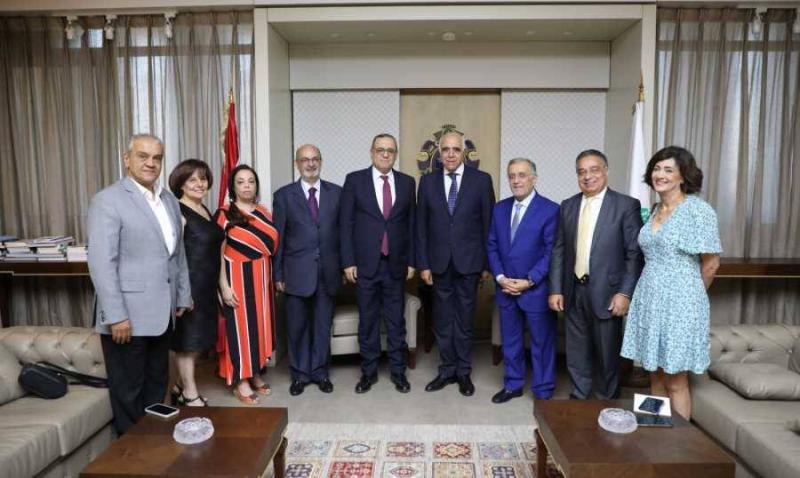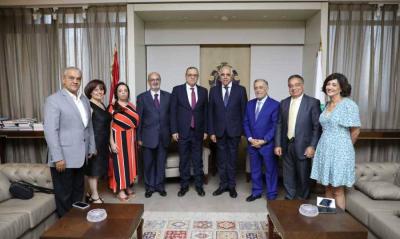The Lebanese Press Editors Syndicate, headed by Joseph Al-Qaysifi, visited Acting General Security Director Major General Elias Baysari. Al-Qaysifi praised Baysari's efforts during these difficult times for Lebanon, particularly in addressing challenges that pose an existential threat to the Lebanese, foremost of which is the issue of Syrian displaced persons which General Security was the first to address. A dialogue took place between Baysari and the members of the syndicate council, discussing general national issues and others such as the passport issue and matters within the jurisdiction of General Security in public facilities.
Regarding the situation in the south and the outcomes of his visit last week to the UNIFIL leadership and his meeting with its commander, Major General Aroloa Lazaro, Baysari stated: "We are in close and ongoing cooperation with UNIFIL leadership to monitor new developments in the region, and we jointly follow all the events and field developments, particularly regarding the documentation of maritime, aerial, and ground violations committed by the Israeli army. We also assist in strengthening the bonds of cooperation between Lebanese residents and UN forces in their area of operations in the south based on Resolution 1701."
As for what is happening along the Blue Line, Baysari emphasized that "this line is a withdrawal line, not an international border, and we insist on preventing any breach or aggression, especially the ongoing attempts to take control of the Lebanese part of Ghajar and some hills in Kfarshouba, and we are committed to all our rights. The army, security forces, and UN forces are fulfilling their duties in a way that guarantees Lebanon's full rights without compromising any inch of our lands."
On the Syrian displacement crisis, Baysari confirmed that "Lebanon insists on obtaining all the data held by UNHCR, unconditionally, because this concerns the right of the Lebanese state and the sovereignty of its decision," and this was his opinion that he conveyed to the relevant official authorities on this matter. He added: "One of the reasons for obtaining the data is to prevent administrative and security problems that could arise in the future, particularly concerning the registration of births and avoiding turning them into undocumented individuals, and the serious implications of this file. Lebanon is not a country of asylum but a transit country according to the agreement signed between Lebanon and the UNHCR in 2003. We will do everything necessary to protect Lebanon's interests and compensate for the losses we have suffered during the years of the crisis at all levels."
Regarding his opinion on the recent decision issued by the European Parliament concerning Syrian refugees, Baysari said, "It is an unrealistic and non-binding decision for anyone, and we will confront it by all means that preserve Lebanon's interest and its people. We will not surrender to any decision issued against Lebanon's interest, and I believe the country cannot bear such a decision."
He added: "We must understand that the guaranteed solution requires the cooperation and joint efforts of three main pillars, which are Lebanon, Syria, and the international community." He viewed that "there are no solutions except through rebuilding the state and its institutions by shortening the vacancy period of the presidency, organizing relations between constitutional authorities, and rectifying the political and economic situation in the country."
Regarding communications with the Syrian side, Baysari stated that they are ongoing and in a climate of cooperation, noting that he sensed during his visit to Damascus that there is no issue with the Syrian authorities regarding any voluntary and safe return of the Syrian displaced persons residing in Lebanon.
On inquiries about the number of Syrian displaced persons who have returned to their country, Baysari clarified that "since the outbreak of events in Syria, Syrians have been arriving in large numbers to Lebanon, and at that time, UNHCR registered them in its special records. In 2015, at the request of the Lebanese government, UNHCR stopped its registration of new names for displaced Syrians, and according to UNHCR's data, the number at that time was about 800,000 displaced persons. However, in reality, UNHCR has continued to register new names from 2015 until today in parallel records under the pretext of distributing some assistance to them, and the additional number has reached about 700,000 names.
As for the number of Syrians who left through the voluntary and safe return mechanism organized by General Security since 30/11/2017 until today, it amounted to 21,706 Syrians, of whom 16,155 were registered as displaced on UNHCR lists." He added: "Those who left of their own decision and had their situations settled at the border crossings numbered 579,668 Syrians, of which only 16,070 were registered as displaced on UNHCR lists. Some of these who returned to Syria enter Lebanese territory through legal means according to the instructions issued by General Security. Others move between Lebanon and Syria through illegal means via land borders."
In the file of passports, Baysari pointed out that "personal efforts are being made to secure a new grant to finance the provision of new passports to enhance our sufficient resources," emphasizing that "the complaints of citizens do not denote a loss of passports, but the problem lies in the unprecedented rush of citizens to request passports as if they were credit cards, which has created significant pressure on the administration and citizens alike," revealing that "66 percent of those who obtained passports did not use them."




